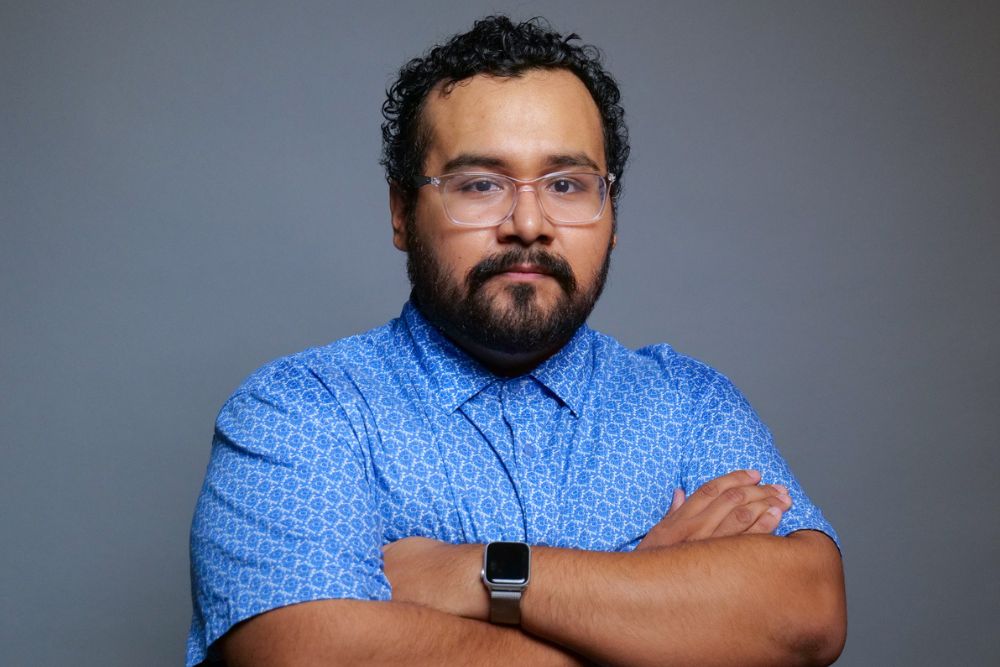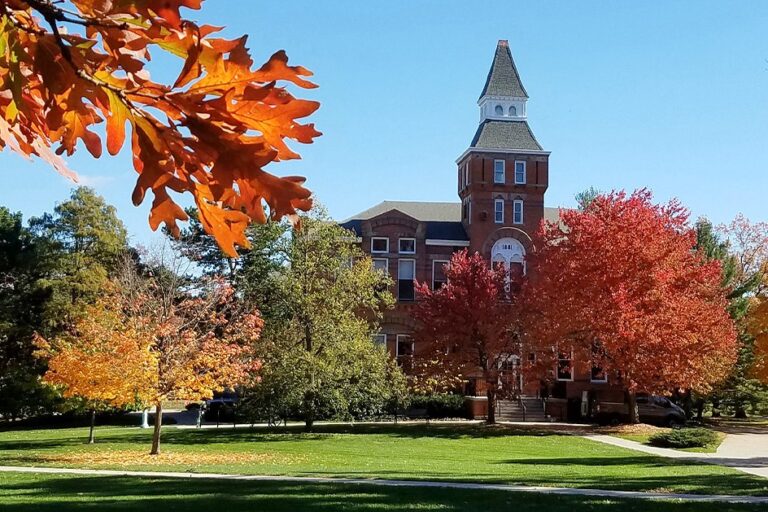A first-generation Latino scholar, Greg Rogel’s research on the health disparities faced by immigrant/Latino communities hits close to home.
For this research, the fifth-year doctoral candidate in Philosophy at Michigan State University recently was named a Sadler Scholar by The Hastings Center and now is receiving invitations to speak about his research to physicians, academics, and other professionals.

Sadler Scholars are a select group of doctoral students from underrepresented racial and ethnic communities with research interests relevant to bioethics. Yet while other 2022-2023 Sadler Scholars are majoring in subjects like public health, bioethics, and neurology, Rogel is the only one studying philosophy. But perhaps a philosophical approach to medical and biological ethical questions is not such a leap as one might think.
While philosophy has always been difficult to define, Rogel says it’s basically a general or comprehensive type of inquiry.
“The pandemic showed us that our health care system was broken, and the pandemic merely made it worse. When things start to break apart, they hit the most disenfranchised the hardest.”
Greg Rogel
“An inquiry is an attempt to try to understand what is true and why, what makes ‘it’ it,” he said. “You can have someone who does metaphysics, someone who does ethics, there’s philosophy of science, there’s philosophy of medicine, it goes on and on. Because it’s so malleable, that’s why you can have someone who does bioethics too.”
Rogel’s research sits at the intersection of social/political philosophy and population health science. It is through this interdisciplinary approach that he explores how immigration is a social determinant of health, which can help explain the cause of immigrant health disparities. “When it comes to philosophy, I feel MSU is best at professionalizing people who care about this engaged work, who want to do this work, giving them the support and training they need to do that work effectively.”

According to Rogel, social/political philosophy helps him investigate structural elements (immigration policies, laws, enforcement efforts, etc.) that can create and maintain inequalities and inequities. Population health science gives him the tools to obtain data about family separation, childhood trauma, fear of police, and more. All of these factors can directly and significantly impact the health and well-being of immigrants and were exacerbated by the COVID-19 pandemic.
“The pandemic showed us that our health care system was broken, and the pandemic merely made it worse,” Rogel said. “When things start to break apart, they hit the most disenfranchised the hardest.”
Career Choices Shaped by Electives
Born in Lynwood, California, Rogel and his family lived in various cities in Los Angeles County while he was growing up, including Compton, Paramount, and East Los Angeles. In high school, he took an art class on a whim. His teacher discovered he had a passion for film and got him a school camera to create some filmmaking projects. Recognizing his talent, the teacher encouraged Rogel to apply to college and study film. Later, as a Film major at California State University, Fullerton (CSUF), Rogel took an elective called “Philosophy of Film,” another class that changed the course of his future.
“Electives have guided my life,” said Rogel, who became hooked on philosophy, taking more courses and meeting several professors from the Philosophy Department who mentored and pushed him to go to graduate school.

Matthew R. Calarco, a Philosophy Professor at CSUF, remembers when a small group of philosophy students gathered to view and discuss the complex film Under the Skin.”I know the sacrifices that my parents and grandparents made. I feel obligated to try to give back, not just to my family but to my community because that’s the way I was raised.”
“I had watched and studied the film carefully many times and had given it serious thought,” Calarco said. “Greg, upon a single viewing, was able to discern and dissect many of the hardest issues the film raises. What’s more, his background in film allowed him to see aspects of the work (scene framing, lighting, and so on) in ways I hadn’t even considered. I knew that Greg was destined to become a formidable thinker and artist in his own right.”
“I knew that Greg was destined to become a formidable thinker and artist in his own right.”
Matthew R. Calarco
Rogel says he never really made a conscious plan to go the philosophy route. Instead, he calls it a feeling, or intuition, that made him realize philosophy could give him the opportunity to accomplish some really important work.
“The philosophy professors who influenced me didn’t just philosophize about abstract things like ‘what is the nature of reality?’ or ‘what is the essence of truth?’ or something like that,” Rogel said. “They always tied it to a real-world situation. And given my background, I had plenty of real-world situations — things that I thought were not acceptable for society or things that were rough while we were growing up that no one should have to experience.”

What most appealed to Rogel about philosophy was the notion of “engaged philosophy,” or using deep analytical skills to help communities address real-world problems.
“The ancient philosophers are actually the perfect example of this work, particularly Socrates,” Rogel said. “They would go out and talk to folks, having conversations and sharing their ideas with a broader audience.”
Drawn to MSU’s Engaged Philosophy Approach
It was MSU’s pluralist approach to contemporary philosophy that appealed to Rogel when he was researching graduate programs.
“It was very clear to me that MSU was the best place to do this kind of work. And I’ve been very happy with my time here,” Rogel said. “To do engaged work you need people who want to do it and have the skills to do it. There is a certain amount of intentionality behind it. When it comes to philosophy, I feel MSU is best at professionalizing people who care about this engaged work, who want to do this work, giving them the support and training they need to do that work effectively.”

Rogel completed an internship this summer with Project Rebound at CSUF, whose mission it is to help formerly incarcerated people receive higher education. This internship opportunity was provided by MSU’s Department of Philosophy through its Engaged Philosophy Internship Program (EPIP).
Rogel is now looking forward to earning his doctoral degree from MSU in Spring 2023. For now, he wants to keep his options open, so he tries not to be too specific when discussing his professional goals. He knows he wants to be as close as possible to his family on the West Coast, wants to teach, and would like a position where he can continue his research and hopefully conduct advocacy or outreach work.
“I know the sacrifices that my parents and grandparents made. I feel obligated to try to give back, not just to my family but to my community because that’s the way I was raised.”
Greg Rogel
“I want to give back,” Rogel said. “I know the sacrifices that my parents and grandparents made. I feel obligated to try to give back, not just to my family but to my community because that’s the way I was raised. It’s not something I think about. It’s just something that’s been ingrained in me since I was a young child. Very few people are ever going to have the opportunity to get a Ph.D., so I can’t let that opportunity go to waste.”


